by Lisa Cooke | Sep 2, 2016 | 01 What's New, Records & databases
New and updated genealogy collections from all around the world are just a click away! Sail your way from Norway across the Atlantic to the U.S. state of Michigan, then head across the Pacific to Korea and end your virtual voyage in Australia with the Victoria Passenger lists.
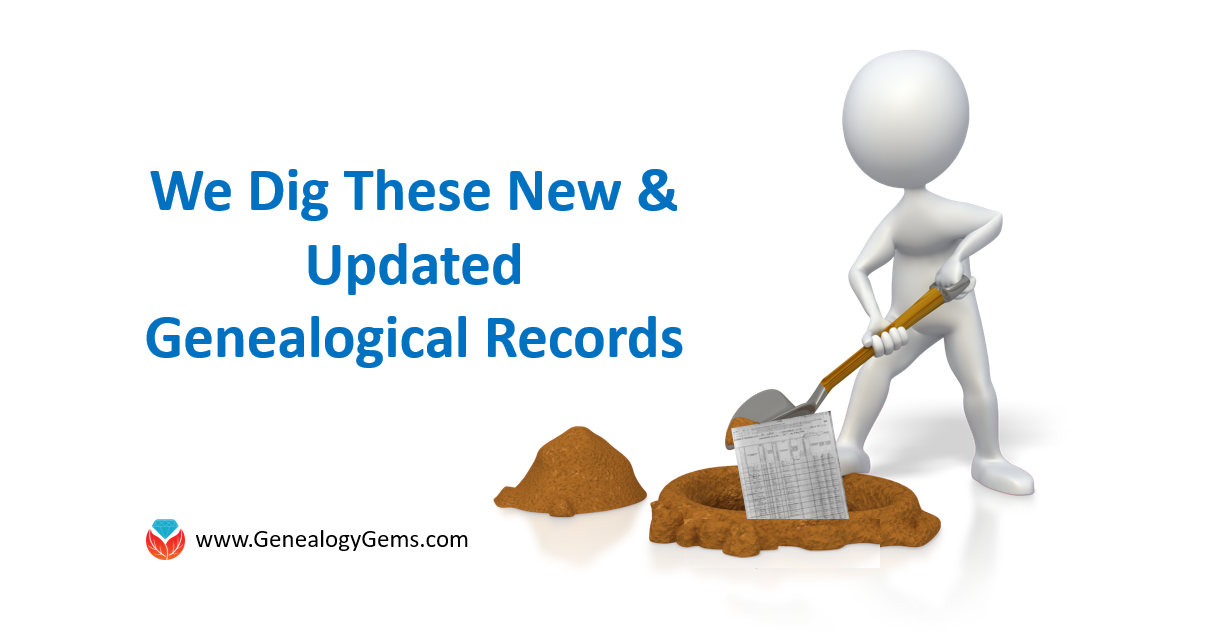
Norway Genealogy Records – Probate
FamilySearch has a new collection this week titled Norway, Probate Index Cards, 1640-1903. Only a small number (194,981) have been indexed. These are not digital images, but like the title says, it is an index.
These index cards were created by the regional archives in Norway. Not all regional archives created an index so, the collection does not cover all of Norway. FamilySearch has indexes for the following counties:
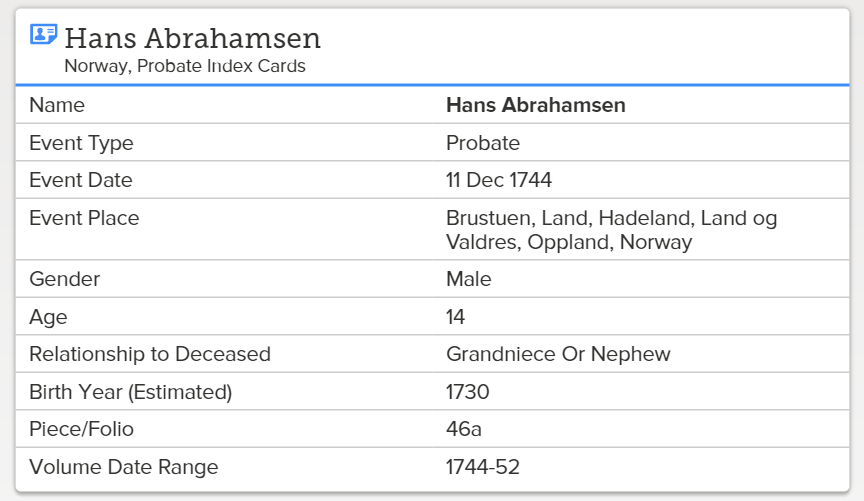
- Akershus
- Aust-Agder
- Buskerud
- Hedmark
- Oppland
- Østfold
- Rogaland
- Telemark
- Vest-Agder
- Vestfold
Each index card may include the following:
- Probate district
- Volume (inclusive dates) and page number
- Farm name
- Parish
- Date of probate
- Name of the deceased & spouse
- Name of children/heirs
- Decision of the court
United States – Michigan – Oral Histories
The Ypsilanti Library has just launched their African American Oral History Archive. It’s been 40 years, but dozens of leaders of the Ypsilanti African American community were interviewed about their personal experiences during the Great Depression, WWII, and the Civil Rights movement. Now, these interviews are being digitized and will be made available online.
Although only one interview is available at this time, over the next 9 months, historians will be putting more of their stories online at the A.P. Marshall African American Oral History Archive website. You can enjoy the first interview with Eugene Beatty, a track athlete who nearly made the U.S. Olympic team in 1932, now.
In addition to interview recordings, the online archive will include a transcript with photographs of the subjects.
Korea – Civil Service Records and Genealogies
Wow! It has been a long time coming, but finally, we have two new database collections for Korea. FamilySearch.org has digitized over 2 million records for these collections. The Korea Collection of Genealogies, 1200-2014 was added this week and boasts family biographies, genealogies, and histories. The records are in Korean and Chinese, but for translation tools, see the section titled For Help Reading These Records.
These genealogies are not yet indexed, so you will need to use the browse feature we shared with you last month. You can read that article here.
The second collection for Korea is titled Korea Civil Service Examinations and Records of Officials and Employees, 1390-1900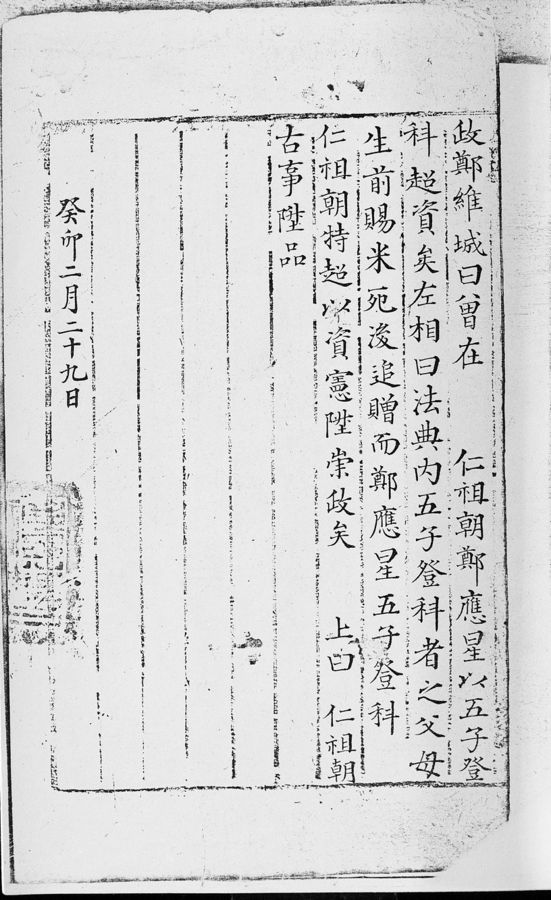 . This is a rather small collection of just over 4,000 records.
. This is a rather small collection of just over 4,000 records.
This collection will include records from Jeollabuk-do and Jeonju-si, South Korea. The records are in Korean and Chinese, dated from 1392 to 1910, and include Korean civil service examinations from the Joseon Dynasty.
The civil service examinations under the Joseon dynasty were known as the gwageo. These were very difficult tests and central to education during the Joseon dynasty. The test assessed the applicant’s knowledge of Chinese classics and, occasionally, technical skills. Passing the test qualified the individual to enter into the higher governmental or aristocratic positions.
The civil service examination may contain some valuable information, such as:
- Name of Employee
- Date and Place of Birth
- Names of Parents
- Name of Spouse
- Residence
Australia – Victoria – Passenger Lists
New from Findmypast, Victoria Coastal Passenger Lists 1852-1924 is the largest release of Australian records to date! These passenger lists cover the great Gold Rush and contains 3.3 million records. Both transcripts and digital images of the lists are found in the collection. Generally speaking, you will find the following information:
- First and last name(s)
- Sex, age, and birth year
- Marital status
- Occupation
- Year of arrival
- Ship name
- Departure port and date
- Arrival port and date
The early 1850s marked great gold discoveries in Australia. People immigrated to the area in masses to stake their claims. The population exploded and by 1871, 1.7 million people had immigrated to Victoria. Perhaps you always wondered what brought your family to Australia. This collection may finally provide the answer!
More Gems on New and Updated Genealogical Records
WorldCat Gets a Major Addition: New Genealogy Records Online this Week
England Emigrants and More: New Genealogy Records Online
by Lacey Cooke | Sep 2, 2018 | 01 What's New, School Records |
School records can fill in the gaps in missing vital records, as well as provide a rare glimpse into the daily lives of our ancestors. Guest blogger Margaret Linford shares her personal stories about how schools can connect us to our families. She also provides great...
by Diahan Southard | Jul 24, 2014 | 01 What's New, Beginner, Newspaper
 Recently I decided to learn more about my great-uncle Paul McClellan, my grandfather’s brother. After World War II, Paul left his Idaho hometown for Pennsylvania. Surviving relatives know hardly anything of his life or family.
Recently I decided to learn more about my great-uncle Paul McClellan, my grandfather’s brother. After World War II, Paul left his Idaho hometown for Pennsylvania. Surviving relatives know hardly anything of his life or family.
The census only takes me through 1940 and he lived through the 1970s. Pennsylvania vital records are pretty tight-lipped. So almost immediately, I found myself looking for obituaries.
Our online community tree at FamilySearch told me when and where he died. I emailed the local history and genealogy contact at the public library in that town. I heard back within a day and had this obituary within a week.
I’ve seen a lot of detailed obituaries. But perhaps because I’m so thirsty for information on Paul, the level of detail in this obituary made me especially happy. I see his:
- Age
- Street address
- Hospital where he died and length of stay there
- Birthplace and age
- Parents’ names, including mother’s maiden name
- Employer and retirement date
- Membership in local civic organizations
- WWII Army veteran status
- Surviving widow’s name, including maiden name
- Names, spouses and residences of surviving siblings
- Name of funeral home and officiator of funeral
- Cemetery name
Wow! Some of these details confirmed that I had the right guy: his age, birth data, relatives’ names. Others open new avenues of research for me. I’ve already started following leads to the civic organizations, funeral home and cemetery.
You know, what is NOT said in this obituary may also prove important as I continue my research on Paul. First, there are no surviving children or grandchildren listed. This disappoints me as I was told he did have children by at least one previous marriage. If he did have children, the informant (his widow?) either didn’t know about them or didn’t choose to mention them. Second, the informant did know a lot about Paul’s kin. Maybe Paul and his wife didn’t totally lose touch with the folks back home–it just seems so years later.
Have you worked much with obituaries? Do you know how to find them? Learn more in Lisa’s book How to Find Your Family History in Newspapers, available in print or as an e-book. There’s an entire chapter on online digitized newspaper collections, and one on online resources for finding newspapers (either online or offline). Yet another chapter is devoted to African American newspapers. This book will teach you to find all those elusive obituaries–and plenty more mentions of your family in old newspapers.
by Lisa Cooke | Oct 16, 2016 | 01 What's New
We know you want to keep up-to-date with where Lisa will be giving her lectures and presentations. This fall, we have three upcoming events. Here all the details:
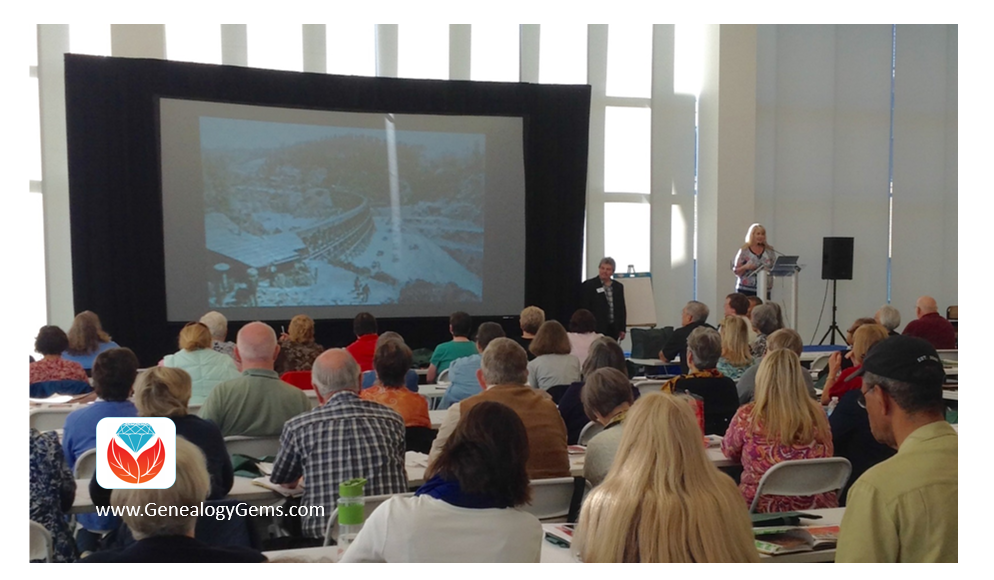
Lisa Louise Cooke speaking at the Columbus Ohio Metropolitan Library
Upcoming Events: Kansas
The Johnson County Genealogical Society will be holding an all day seminar on the 22nd of October. Lisa’s topics include:
- How to Reopen and Work a Genealogical Cold Case
- The Great Google Earth Game Show
- Tap Into Your Inner Private Eye: Nine Strategies for Finding Living Relatives
- Ways to Enhance Your Genealogy Research with Old Maps
What: Johnson County Genealogical Society 2016 Annual Seminar
When: Saturday, Oct. 22, 2016
Where: The Ritz Charles Event Center, 9000 West 137th Street, Overland Park, KS 66221
The event will take place at the Ritz Charles Event Center, 9000 West 137th St., Overland Park, Kansas. Registration is now open. To register online, click here.
Upcoming Event: Texas
Next on the list is the four day conference hosted by the Texas State Genealogical Society. This conference will take place in Dallas on October 27th through the 30th, and includes 35 speakers and an exhibit hall. Lisa will be giving two lectures:
- Beginning Evernote for Genealogists
- Using Google Earth for Genealogy
What: Texas State Genealogical Society Conference
When: Oct. 27 – 30, 2016
Where: Crowne Plaza Dallas Downtown
Online registration and payment is available through October 21st, but after that date you will need to register and pay in-person at the event, if space is still available.
Upcoming Events: Florida
Lisa’s final in-person speaking engagement for 2016 will be presenting as the Keynote Speaker for the 20th Annual Central Florida Family History Conference.
What: 20th Annual Central Florida Family History Conference
When: Saturday, November 12, 2016
Where: Olympia High School at 4301 S. Apopka Vineland Rd., Orlando, Florida.
You can register for the all-day conference online here. If you have a young person who is interested in genealogy, you’ll want to be aware that all students under the age of 18 are admitted free! Learn more details by visiting the Central Florida Family History Conference homepage.
Can’t Make it to an Upcoming Event?
 A Premium Membership to Genealogy Gems will give you access to over 30 of Lisa Louise Cooke’s video classes. From Evernote to DNA, Cloud computing and advanced research techniques, you will find this a great resource for your learning and inspiration. For more information on becoming a Premium Member, click here.
A Premium Membership to Genealogy Gems will give you access to over 30 of Lisa Louise Cooke’s video classes. From Evernote to DNA, Cloud computing and advanced research techniques, you will find this a great resource for your learning and inspiration. For more information on becoming a Premium Member, click here.
by Lisa Cooke | Jan 14, 2017 | 01 What's New, Newspaper
Newspapers can fill in the gaps to the long-lost stories of your ancestors. These tips will help you narrow your search in digitized WWII newspapers for experiences directly relating to the war and to the lives of your ancestors.

In this previous post, I provided step-by-step tips for locating WWII-era newspapers. Those tips helped you locate the actual newspapers. In this post, I’ve got 7 tips for to help you focus on narrowing down a large list of results in search of war-related family stories.
Tip 1: Try Various Name Combinations in WWII Newpapers
If you are keyword searching in digitized newspapers, remember to try different name combinations. A man may be identified by just his first initial and last name. During the 1940s, a woman might be referred to as “Mrs. Ted Johnson” instead of Barbara Johnson.
Tip 2: Search for Addresses
You might find a family identified as “the Johnson’s of 132 Cherry Lane,” so try using street addresses in your searches, remembering that “Lane” might be spelled out or abbreviated. You may also find the family listed by their town or township. An example of this might be “the Johnson’s of Brown township,” or “the Johnson’s of Conover.”
Tip 3: Expand Your Search to Events and Organizations
Use any search terms you already know about for your family in World War II: a military unit, a battle or local service organization, or a war effort project that the folks back home may have helped out with. Do family stories mention rationing, air raid drills, bomb shelters, blackout rules, or one of the women getting a job at a certain factory? All these make excellent search terms.
Tip 4: Take Time to Browse
Browsing the pages will give you a sense of how the war affected everyday life at home. You may find recipes that make the most of ration allowances and reminders about blackout rules and curfews. You may even find tips on how to conserve gasoline or how to be fashionable without silk stockings!
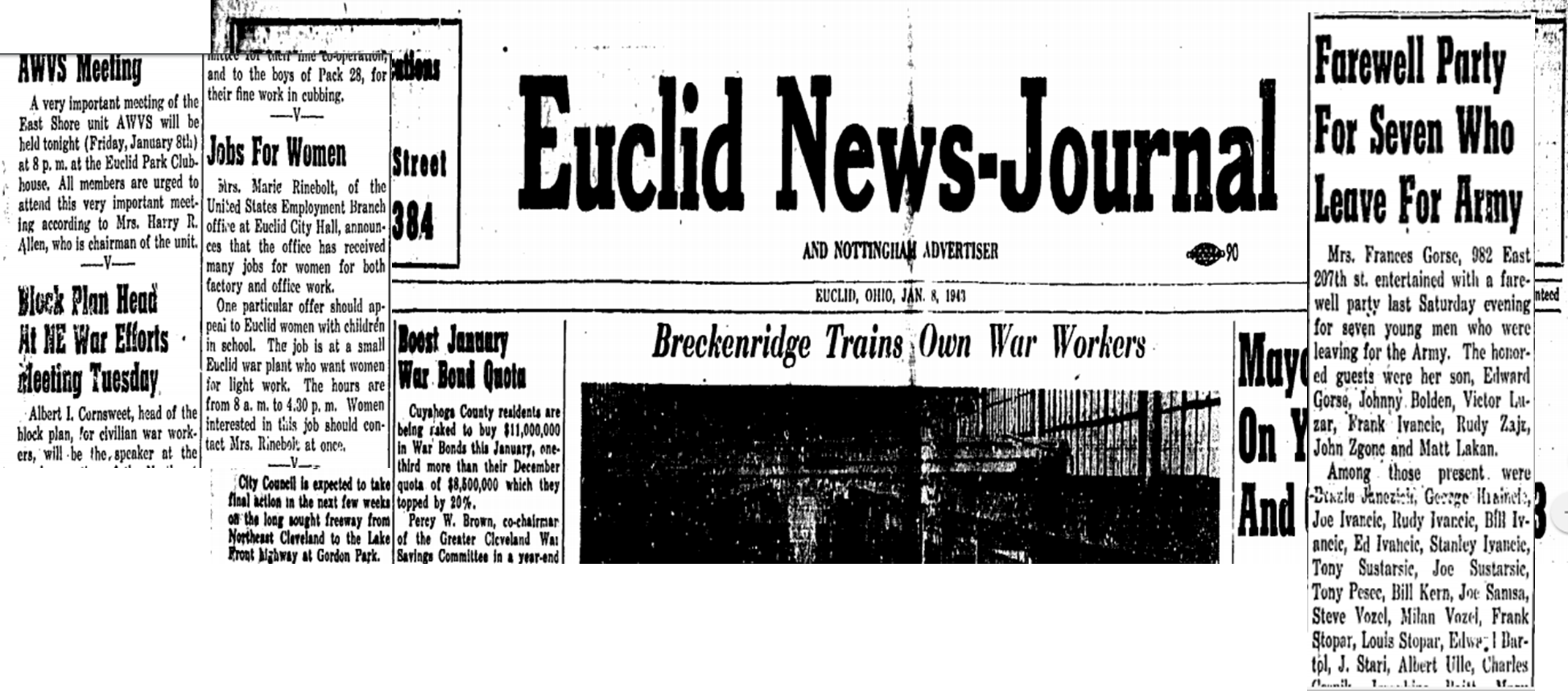
Almost every news item on the front page of this Jan 8, 1943 issue of the Euclid News Journal (OH) has to do with the war. It’s easy to see how the war affected everyday life of this small Ohio city on the shores of Lake Erie. Issues of this paper are searchable at the Euclid Public Library website (click image to view more issues.)
Tip 5: Be Aware of Newspaper Stoppages
If your family lived in an area that came under attack or was occupied, the local newspapers may have stopped printing. In that case, search other papers to see if they reported what was going on in your ancestor’s town.
Tip 6: Keep an Eye on the Homefront
For relatives who served in the military, watch for updates in local papers about how they were faring on the fronts during the war. Watch for casualty lists of the wounded, dead, and missing. Here’s something cool: newspapers also printed maps showing the progress of the war on the various fronts.
Tip 7: History Provides Hints
If you’re looking for reports about soldiers’ bodies returning home and funeral services, it will help to know that according to an article in The Wall Street Journal, the War Department didn’t start bringing back remains until the fall of 1947 because of the huge logistical challenges involved. Over 93,000 American soldiers who died in World War II are buried overseas in one of the American Battle Monuments Commission cemeteries.
Making the Most of Newspapers for Family History
 Find more tips like these in my book, How to Find Your Family History in Newspapers. You’ll find step-by-step instructions for my foolproof research process, along with everything you need for success: worksheets and checklists, tons of free online resources (and websites worth paying a few bucks for), a massive amount of location-specific websites (U.S. and international)–and a case study that puts it all to the test!
Find more tips like these in my book, How to Find Your Family History in Newspapers. You’ll find step-by-step instructions for my foolproof research process, along with everything you need for success: worksheets and checklists, tons of free online resources (and websites worth paying a few bucks for), a massive amount of location-specific websites (U.S. and international)–and a case study that puts it all to the test!


 . This is a rather small collection of just over 4,000 records.
. This is a rather small collection of just over 4,000 records.





